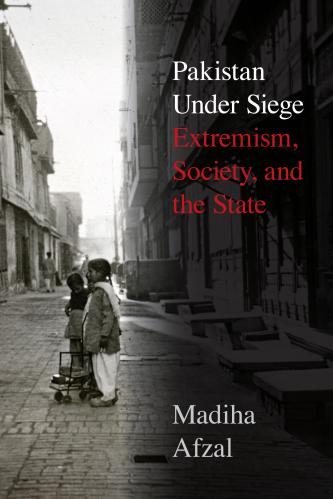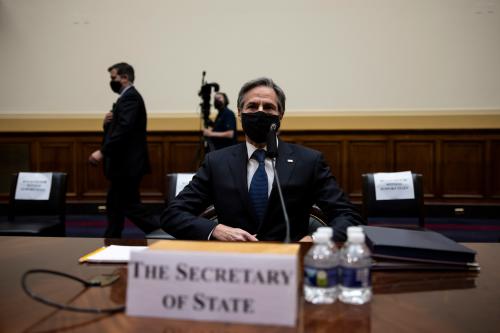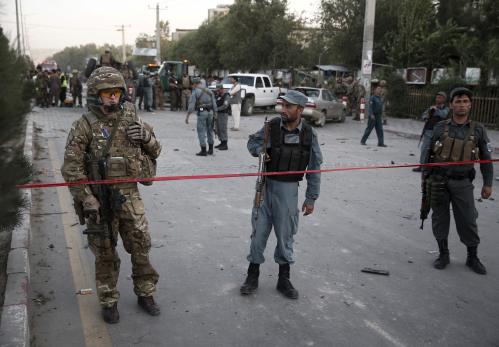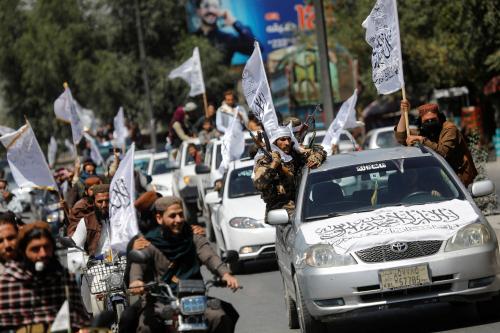In debates on the future of the war in Afghanistan, policymakers and analysts have come to invoke it as a given that Americans want the troops to come home quickly. But does this conventional wisdom hold true? Not necessarily, based on our analysis of a number of polls on Americans’ views on Afghanistan conducted in the last few years.
Ordinary Americans display a significant degree of ambivalence on the question of withdrawing troops from Afghanistan. Veterans are also divided on this question but are more likely to show strong opinions on both sides of the spectrum. The data suggest that vocal, concerted grassroots campaigns currently conducted by veterans groups represent just one subset of veterans. More specifically, veterans who served after the 9/11 attacks are more likely to feel strongly about ending our involvement in Afghanistan.
A look at the data reveals that a significant number of Americans surveyed don’t respond to questions about withdrawing troops, possibly reflecting a lack of strong opinions. In a recent poll conducted in the fall of 2020 by the National Opinion Research Center (NORC) for researchers Peter Feaver and Jim Golby, only 59% of survey respondents answered the question about withdrawing troops from Afghanistan. In previous polls, one conducted by the University of Maryland in October 2019 and the other by YouGov in 2018, approximately one-fifth of respondents opted not to answer questions about troop levels in Afghanistan. Underlying this is the fact that American voters do not rank foreign policy highly in their list of priorities — a survey of registered voters in 2020 found that they ranked it sixth out of a list of 12 priorities — and Afghanistan is but one of several pressing foreign policy issues facing the United States.
In these polls, even respondents who do offer an opinion on withdrawal are divided on the question. In the NORC fall 2020 poll, 34% of survey respondents said that they supported troop withdrawals (in exchange for the Taliban’s counterterrorism assurances as per the deal struck in Doha in February 2020), while 25% said they opposed them. While one would have expected the Doha deal to have normalized the idea of withdrawals in the fall 2020 survey, that hasn’t quite happened. Polling prior to the Doha deal also offered mixed results: Thirty-four percent of respondents to the University of Maryland poll from October 2019 were in favor of maintaining troop levels in Afghanistan, 23% were in favor of reducing troop levels, and 22% were in favor of removing all troops in the next year. A similar question asked by YouGov in 2018 also revealed mixed results.
Interestingly, however, there was greater support in the YouGov poll for removing all troops if the decision was made under a hypothetical presidential authorization. Sixty-one percent of respondents supported withdrawal in that case, while 20% opposed it. No timeline was provided for this question. The lack of a majority for either option in any of the polls — along with clear majority support for withdrawal in case of a presidential authorization — indicates the public’s uncertainty on Afghanistan policy. This suggests that the government’s policy decisions on Afghanistan may drive public opinion, rather than the other way around.
The lack of a majority for either option in any of the polls … indicates the public’s uncertainty on Afghanistan policy.
Americans overall are more likely to support the notion of a longer timeline for withdrawal: The YouGov poll conducted in 2018 looked at a five-year time horizon and found that 42% of respondents were in favor of removing all troops in the next five years — that is, by 2023 — suggesting that the ambivalence we highlighted above manifests in shorter-term time horizons.
In the NORC and YouGov polls, military respondents are more likely to express an opinion on questions about troop withdrawal than civilians are. In the YouGov poll, that increased military response rate translated to higher support for both sides of the spectrum on the question of withdrawal: increasing and maintaining troops, as well as removing troops within the next year (but not for decreasing troop levels). Military respondents were also more likely to respond when asked about their opinion regarding the hypothetical presidential authorization of a withdrawal. That increased response rate corresponded with an increase in military support for withdrawal under presidential authorization when compared to the general public.
Opinions among military members are divided on withdrawal from Afghanistan, depending on their experiences. According to the NORC poll, 40% of veterans who served prior to 9/11 supported troop reductions and 32% opposed them. Yet 54% who served post-9/11 supported reductions, and 29% opposed them. It is perhaps not surprising that veterans of the post-9/11 wars are more weary of these wars.
The YouGov 2018 poll reveals notable differences between veterans who are 25 to 34 years old and those who are older. The plurality of the younger group supported maintaining troop levels for the next year, while the older group was somewhat evenly divided between all of the options — increasing, maintaining, decreasing, and removing all troops. The younger age group is also far less likely to favor removing all troops in the next year relative to the older groups: Nine percent of the younger group expressed a desire to withdraw all troops in 12 months compared to roughly 30% of the older group.
The American public is unsure about the next steps to take in Afghanistan, and for good reason: The decision is a very difficult one, with downsides to both staying and leaving. The public seems to be partly ambivalent, partly divided on the correct course of action. Veterans groups are also divided on the right policy decision. What’s clear is that the common refrain in policy debates that “Americans want out” is not accurate and should not be presented as the driving force for efforts to withdraw from Afghanistan.






Commentary
Americans are not unanimously war-weary on Afghanistan
March 19, 2021